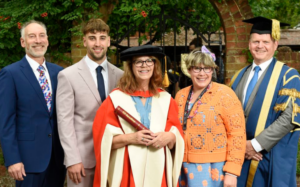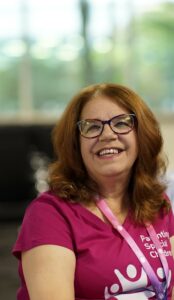From mature student to Honorary Doctorate recipient, Dr Ruth Pearse reflects on how the University of Reading shaped her life. She also shares how her own personal journey inspired her to set up the charity – Parenting Special Children.
 When Ruth crossed the stage to receive her honorary degree, almost 30 years after completing her studies at Reading, the moment felt deeply personal.
When Ruth crossed the stage to receive her honorary degree, almost 30 years after completing her studies at Reading, the moment felt deeply personal.
“I struggled in school and I wasn’t particularly academic,” Ruth reflected. “Even getting the chance to come to university was amazing – I valued it so much. Then to be given an honorary degree was incredibly special. It’s something that will stay with me forever.”
For Ruth, it was a moment to not only reflect on her own personal journey, but a chance to reflect on the teamwork of her charity, Parenting Special Children (PSC) – a Berkshire based organisation that has supported thousands of families raising children with special educational needs and disabilities.
A life changing experience
Ruth’s connection with the University began in the early 1990s, when she embarked on a BA in Education which combined literature, language and teacher training. At 26, she was a mature student seeking a new direction.
She explained: “I’d had a major life change and decided I wanted to become a teacher. I wanted to study, to do something meaningful, and going to university did exactly that. We explored feminist literature and writers from diverse backgrounds. It opened my eyes to perspectives I hadn’t encountered before.”
One lecturer in particular, Emerita Professor Rhona Stainthrop, left a lasting impression on Ruth. She shared: “She was right at the start of pioneering research into phonics, which was relatively new at the time and very forward-thinking. It was a lovely surprise to see her again at my graduation – some lecturers really inspire you and for me, it was her.”
For Ruth, university was transformative. She explained: “Going to university and graduating with a 2:1 was a period of time that really boosted my self-esteem.
“It showed me that there isn’t just one route through education – you can go back later in life and find your own way.”
It was also where Ruth met her husband, then a PhD chemistry student, and made lifelong friendships. She reflected: “Going to university did exactly what I hoped for – it changed my life.”
A personal journey into specialist education
With both parents working in specialist education, Ruth’s interest in supporting children with additional needs was already front of her mind. After graduating, she began teaching in a primary school with a specialist unit for children with disabilities.
She said: “That resource unit was very impactful on my life. It confirmed this was the path for me.”
 The professional interest became personal when two of her three children were diagnosed with specialist educational needs. Ruth suddenly found herself navigating the challenges of raising neurodivergent children while balancing family life.
The professional interest became personal when two of her three children were diagnosed with specialist educational needs. Ruth suddenly found herself navigating the challenges of raising neurodivergent children while balancing family life.
She shared: “Teaching is a demanding job and I found it impossible to juggle family life with the demands of teaching – so I took time off to raise my three children. There are a lot of different challenges that come with raising neurodivergent children which can be isolating for parents.”
A friend encouraged Ruth to attend a specialist parenting course for parents of children with additional needs. She added:
“Meeting other parents who understood what I was going through was transformational. There was such comfort in being around people who just got it.”
Inspired by the course, Ruth trained to deliver the same programme in 2006 – a decision that led to the creation of PSC. From its earliest days, it was built on empathy, understanding and a lived experience.
Ruth explained: “When I started the charity, it was really important that our team were also parents of children with special needs. You can see the relief in the faces of parents when somebody understands where they are coming from.”
Building a community of support
Today, PSC offers a range of services including sleep workshops, trauma-informed support for adoptive families, and groups for autistic and ADHD children and young people. Ruth explained: “It’s about building a sense of community and reminding people they aren’t alone.”
 The charity also runs workshops for the NHS and partners with schools and local authorities. Ruth is particularly proud of the charity’s pioneering Sleep Service, which began over a decade ago. “Knowledge on the importance of sleep was minimal at that time,” she said. “We trained with the NHS team in Southampton and now have several sleep practitioners running workshops for families across the region.”
The charity also runs workshops for the NHS and partners with schools and local authorities. Ruth is particularly proud of the charity’s pioneering Sleep Service, which began over a decade ago. “Knowledge on the importance of sleep was minimal at that time,” she said. “We trained with the NHS team in Southampton and now have several sleep practitioners running workshops for families across the region.”
PSC’s adoption and trauma-informed work has also grown into a lifeline for families, and over the last decade has supported hundreds of families. Ruth shared: “We realised there was a gap in understanding how trauma affects children’s behaviour and emotional regulation. Now, we run monthly groups for both parents and children. It’s been so powerful to see friendships grow and families find hope together.”
Royal recognitions
Over the years, PSC has been recognised nationally for its impact. In 2020, it was named one of four Berkshire charities honoured by HM The Queen for its contribution during the pandemic. The following year, the Duchess of Edinburgh attended the charity’s 15th anniversary celebration, and this year Ruth was invited to represent PSC at HM The King’s Garden Party at Buckingham Palace. Ruth shared:
“The visit to Windsor Castle was an especially profound experience for me. It was such an honour to meet all members of the senior Royal Family, and especially Her Majesty The Queen.
“It was wonderful to represent the PSC Team in recognition of all the work that we did during the pandemic.”
Her achievements were further acknowledged when the University of Reading awarded her with an honorary degree in recognition of her contribution to families of children with special educational needs.
For Ruth, it was a moment to not only reflect on her own personal achievements, but a chance to reflect on the work of her team. She said: “It was an honour to be awarded the doctorate. After the graduation ceremony I celebrated with the PSC team, because it’s an award I share with them.”
Staying Connected
Ruth’s connection to Reading remains strong. PSC collaborates closely with the University’s Centre for Autism Wellbeing Hub – contributing parent and professional insights over the years.
She said: “I have a huge respect for research as it underpins everything we do. Lived experiences combined with research is incredibly powerful. I was very excited when the Centre for Autism launched.”
PSC also provide regular placements for University of Reading psychology students – many of whom they are still in contact with. “It has been wonderful to see how the now graduates are going on to change the landscape for neurodivergent people across the UK,” Ruth shared.
Ruth also revisits the campus regularly. “I love the University and how green it is – it’s one of the things that drew me there in the first place,” she said. “And as an institution it continues to reach out to the charity. I feel proud to be from a university that cares about the community it is in.”
Looking ahead
Ruth remains hopeful for the future. She shared: “My hope is that the movement of lived experiences becomes stronger and more respected. Consultation needs to be at the heart of everything and we need to ensure that families are listened to at all levels – from government right through – and that changes must be made based on children’s needs, not just on funding.”
Her message to families navigating life with children and young people who have special educational needs or disabilities is to:
“Take one step at a time, ask for help when needed, connect with others who have lived experience and celebrate the wins – the wins are amazing!”




